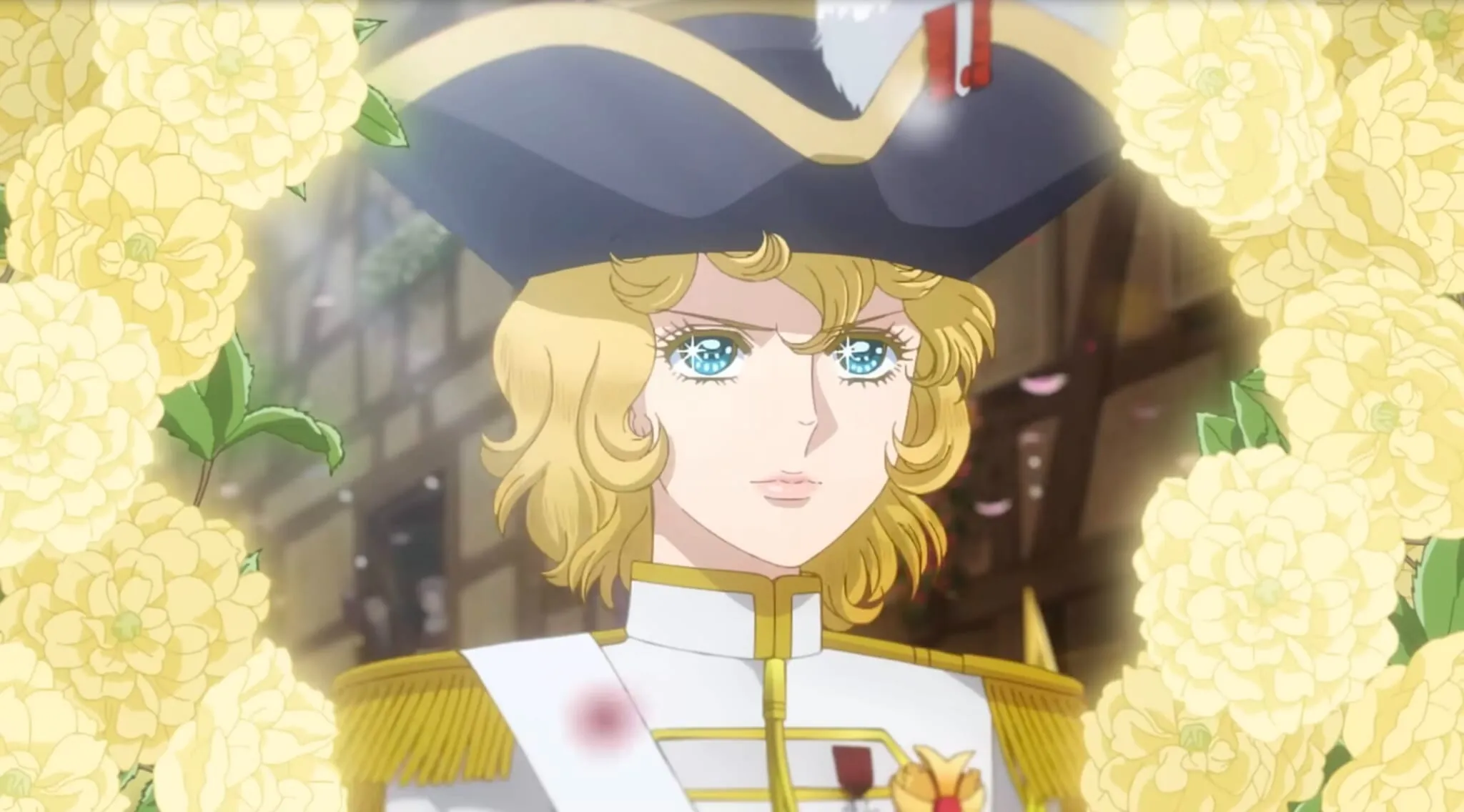The years leading up to the French Revolution offer a cinematic canvas of unparalleled drama, a world of gilded palaces and public discontent. The Rose of Versailles dives headfirst into this turmoil, but through a unique lens. It centers not on one, but two remarkable women whose lives intersect as history unravels.
We meet the young Austrian princess Marie Antoinette, destined to become the infamous queen of France. But her shadow and sworn protector is the film’s fictional heart: Commander Oscar François de Jarjayes.
Raised from birth as a man to secure her family’s military legacy, Oscar serves in the Royal Guard, her identity a known secret in the court. The film sets the stage for a grand story of duty, love, and identity, played out against the backdrop of a society about to tear itself apart.
Artistry in the Age of Excess
Before a single line of dialogue about revolution is uttered, the film makes its thesis clear through its visuals. Studio MAPPA, known for its dynamic animation, has created a visual feast. This isn’t just an update; it’s a loving restoration of the classic 1970s shōjo manga aesthetic for a modern screen.
The screen is constantly filled with rococo flourishes and blooming roses, framing characters whose eyes literally sparkle with stars in moments of heightened emotion. The extravagance of Versailles is palpable in every opulent background. The character designs are beautiful, and Oscar, in particular, is a triumph of androgynous grace and strength.
This rich, theatrical art style isn’t mere decoration. It perfectly externalizes the story’s grand, heart-on-sleeve emotions, creating an atmosphere where sweeping romance and tragic destiny feel entirely at home. The film’s commitment to this aesthetic is its most undeniable strength.
A Kingdom Divided, A Narrative Split
The film’s narrative ambition is to follow the parallel paths of its two heroines. The story begins by focusing on Marie Antoinette, portraying her not as a monster of history but as a deeply sheltered young woman, unable to comprehend a world beyond the palace walls.
This sympathetic lens offers a fresh perspective. However, the film makes a jarring structural choice midway through its runtime. Just as the political tensions escalate, the narrative abandons the queen almost entirely, shifting its focus exclusively to Oscar. Marie, who was positioned as a central figure, becomes a ghost in her own story. This abrupt pivot fractures the film’s foundation.
It feels less like a cohesive narrative and more like two separate, abbreviated stories spliced together. The central relationship between Oscar and Marie, which should have been the emotional pillar of the story, is never given the space to develop, leaving their connection to feel asserted rather than earned.
History on Fast-Forward
The challenge of adapting a sprawling, multi-volume epic into a two-hour film is immense, and The Rose of Versailles buckles under the pressure. Its solution to this compression problem is both its most interesting experiment and its biggest failure: the musical montage.
Whenever the plot needs to advance, or a relationship needs to develop, the film deploys a pop song over a whirlwind of stylized images. It reminds me of the bizarre, non-narrative B-roll on old karaoke tapes. These sequences are used to show years passing and hearts changing, but they are a poor substitute for actual scenes.
They tell us that characters have grown closer or that time has passed, but they deny us the chance to witness it. As a result, the story’s emotional beats lack weight. For anyone not already familiar with the source material, the narrative feels like a highlight reel with crucial context missing, making it a frustrating experience.
A Singular Rose in a Wilting Garden
For all its structural problems, the film is held together by the unwavering strength of its most compelling figure. Oscar’s story is the movie’s undeniable anchor. Her personal journey—grappling with her identity, her duties to a crumbling monarchy, and her forbidden love—is a powerful narrative.
We witness her political awakening as she shifts from a loyal guard of the crown to a sympathizer of the common person’s plight. This evolution gives the film its most solid and resonant throughline. The excellent voice work injects a raw honesty into her internal conflicts. In a film that often feels rushed and emotionally distant, Oscar’s struggle provides a necessary and memorable core.
The Rose of Versailles was released in Japan on January 31, 2025, and will be available for streaming worldwide on Netflix starting April 30, 2025.
Full Credits
The Review
The Rose of Versailles
The Rose of Versailles is a visually spectacular film anchored by a truly memorable hero in Oscar François de Jarjayes. Its breathtaking animation and commitment to a lavish rococo aesthetic are consistently impressive. However, the film's beauty cannot hide a deeply flawed narrative structure. By condensing a sprawling epic into a series of rushed musical montages and abruptly sidelining one of its main characters, it sacrifices emotional depth and coherence. It’s a beautiful but frustrating glimpse of a much better story.
PROS
- Breathtakingly beautiful animation and art style.
- A compelling and well-realized central protagonist in Oscar.
- Successfully captures a theatrical, high-drama atmosphere.
- Strong voice acting for the main character.
CONS
- Severely rushed plot due to extreme condensation of the source material.
- Fractured narrative that feels like two separate, incomplete stories.
- Over-reliance on musical montages in place of character development.
- Key relationships, especially between Oscar and Marie, feel unearned.
